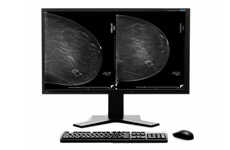
Researchers are Testing a Predictive AI Biomarker for Cancer Care
Jana Pijak — July 11, 2023 — Tech
References: healthitanalytics
Researchers at University Hospitals (UH) Seidman Cancer Center are testing a groundbreaking AI biomarker for predicting the benefits of androgen deprivation therapy (ADT) for patient with prostate cancer. Their study, published in NEJM Evidence, highlights the potential of ADT with radiotherapy for localized prostate cancer.
By analyzing vast patient data using advanced machine learning algorithms, the researchers were able to identify specific genetic signatures associated with improved response to ADT. This predictive biomarker allows health professionals to determine which patients are most likely to benefit from ADT, allowing for more personalized treatment plans and potentially reducing unnecessary treatments for patients that may not be a fit for the treatment.
The utilization of AI in cancer treatment research showcases the technology's endless potential to improve patient outcomes. It also may help health professionals choose better treatment plans that align more with specific patient needs.
Image Credit: Getty Images
By analyzing vast patient data using advanced machine learning algorithms, the researchers were able to identify specific genetic signatures associated with improved response to ADT. This predictive biomarker allows health professionals to determine which patients are most likely to benefit from ADT, allowing for more personalized treatment plans and potentially reducing unnecessary treatments for patients that may not be a fit for the treatment.
The utilization of AI in cancer treatment research showcases the technology's endless potential to improve patient outcomes. It also may help health professionals choose better treatment plans that align more with specific patient needs.
Image Credit: Getty Images
Trend Themes
1. AI Biomarkers - The use of AI biomarkers in cancer treatment research presents opportunities for more personalized treatment plans and improved patient outcomes.
2. Machine Learning Algorithms - Advanced machine learning algorithms offer the potential to analyze vast patient data and identify genetic signatures associated with improved treatment response, revolutionizing cancer care.
3. Predictive Medicine - The development of predictive biomarkers in cancer care allows health professionals to determine which patients are most likely to benefit from specific treatments, reducing unnecessary treatments and improving efficacy.
Industry Implications
1. Healthcare - The use of AI biomarkers and machine learning algorithms in cancer research presents disruptive innovation opportunities for the healthcare industry to personalize treatment plans and improve patient outcomes.
2. Pharmaceutical - The development of predictive biomarkers and AI-based treatment selection methods in cancer care offers disruptive innovation opportunities for the pharmaceutical industry to optimize drug development and personalized medicine.
3. Medical Technology - The integration of AI biomarkers and machine learning algorithms in cancer care provides disruptive innovation opportunities for the medical technology industry to create advanced diagnostic tools and improve treatment decision-making.
6.6
Score
Popularity
Activity
Freshness























